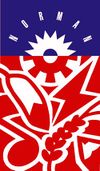Norman, Oklahoma
| Norman, Oklahoma | |||
|---|---|---|---|
| — City — | |||
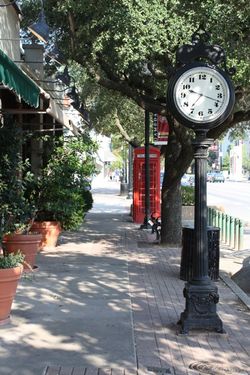 |
|||
|
|||
| Nickname(s): City of Festivals | |||
|
|
|||
| Coordinates: | |||
| Country | United States | ||
| State | Oklahoma | ||
| County | Cleveland | ||
| Government | |||
| - Type | Council-Manager | ||
| - Mayor | Cindy Rosenthal | ||
| - City Manager | Steve Lewis | ||
| Area | |||
| - Total | 189.5 sq mi (490.8 km2) | ||
| - Land | 177.0 sq mi (458.4 km2) | ||
| - Water | 12.5 sq mi (32.4 km2) | ||
| Elevation | 1,171 ft (357 m) | ||
| Population (2010) | |||
| - Total | 115,876 | ||
| - Density | 540.6/sq mi (208.7/km2) | ||
| Time zone | Central (CST) (UTC-6) | ||
| - Summer (DST) | CDT (UTC-5) | ||
| ZIP codes | 73000-73099 | ||
| Area code(s) | 405 | ||
| FIPS code | 40-52500[1] | ||
| GNIS feature ID | 1095903[2] | ||
| Website | http://www.ci.norman.ok.us | ||
Norman (pronounced /ˈnɔr-man/) is a city in Cleveland County, Oklahoma, United States, and is located 20 miles south of downtown Oklahoma City. It is part of the Oklahoma City metropolitan area.[3] As of 2010 Norman was estimated to have 115,876 full-time residents,[4] making it the third-largest city in Oklahoma[5] and the 234th-largest city in the United States.[6][7] It is the county seat of Cleveland County and is the county's center for business and employment.[8]
In 2008, CNN/Money Magazine ranked Norman as the sixth best small city in the United States, the highest ranking of any city in Oklahoma.[9]
The city was founded during the Land Run of April 1889, and formally incorporated in 1891. The city’s economy is primarily based on higher education and related research industries. Norman is home to the University of Oklahoma, the largest university in the state with approximately 30,000 students enrolled.[10][11]
Contents |
History
The central Oklahoma region became part of the United States with the Louisiana Purchase in 1803. Prior to the American Civil War the United States government began relocating the Five Civilized Tribes, the five Native American tribes that the United States officially recognized via treaty, to Oklahoma. The area known today as Norman was assigned to the Creek Nation by treaties of 1832 and 1833.[12]
Following the Civil War, the Creeks were accused of aiding the Confederate States of America and as a result they ceded the region back to the United States in 1866.[12] Shortly after this the Arbuckle Trail, a feeder route to the Chisholm Trail, was developed to hasten the transfer of cattle from Texas to the railroads in Kansas. A federal survey of the empty lands along the Arbuckle Trail was undertaken in the early 1870s, headed by 23 year old Abner Norman. Norman’s work crew set up camp at what is today the corner of Classen and Lindsey streets; it was there that the men, perhaps jokingly, carved a sign on an elm tree that read "Norman’s Camp," in honor of their young surveyor.[12] In 1887, when the Atchison, Topeka and Santa Fe Railway began service to the area, the railroad continued the use of this name for their station site. The area was opened to settlement as part of the Land Run of April 1889; early settlers decided to keep the name "Norman."
On April 22, 1889, the Land Run saw the founding of Norman with at least 150 residents spending the night in makeshift campsites; by the next morning a downtown was already being constructed.[12] Almost immediately two prominent Norman businessmen, former Purcell railroad freight agent Delbert Larsh and railroad station chief cashier Thomas Waggoner, began lobbying for the territorial government to locate its first university in Norman. The two were interested in growing the city and had reasoned that rather than trying to influence legislatures to locate the heavily-contested territory capitol in Norman that it made sense to attempt to secure the state's first university instead (a move that would be far less controversial).[12] On December 19, 1890, Larsh and Waggoner were successful with the passage of Council Bill 114, establishing the University of Oklahoma in Norman approximately 18 years before Oklahoma statehood.[12]
The city of Norman was formally incorporated on May 13, 1891.[13] The city has continued to grow throughout the decades. By 1902 the downtown district contained two banks, two hotels, and a flour mill, and other businesses; by 1913 there were over 3,700 residents living in Norman when the Oklahoma Railway Company decided to extend its interurban streetcar running from Oklahoma City to Moore into Norman, spurring additional population growth.[14] The rail lines eventually transitioned to freight during the 1940s as the United States Numbered Highway system developed. The city population reached 11,429 in 1940.
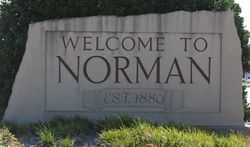
In 1941, the University of Oklahoma and Norman city officials established Max Westheimer Field, a university airstrip, and then leased it to the US Navy as a Naval Flight Training Center in 1942.[14] The training center was used for training combat pilots during World War II. A second training center, known as Naval Air Technical Training Center, and a naval hospital were later established to the south.[14] In the years following World War II the airstrip was transferred back to the university's control.[15] Today the airstrip is called the University of Oklahoma Westheimer Airport. Following the war the remaining military presence and post-war veterans who came to Norman to get an education again grew the city's population, which was 27,006 by 1950.[14] The Navy again utilized the bases in a lesser capacity from 1952 to 1959 in support of the Korean War effort.
With the completion of Interstate 35 in June 1959,[16] Norman found its status as a bedroom community to Oklahoma City increasing rapidly; in 1960 Norman's population was 33,412 but by the end of the decade had grown to 52,117.[14] Throughout the 1960s Norman's land mass increased by 174 square miles by annexing surrounding areas.[14] The city's growth trends have continued, reaching 95,694 in 2000.[14]
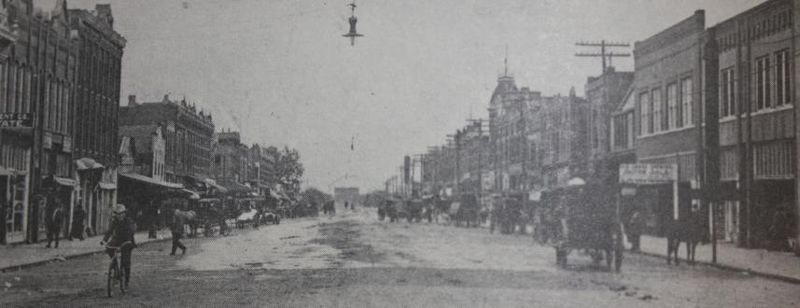
Law and government
A council-manager government has been in place in Norman since the adoption of its city charter on June 28, 1919.[17] A councilor from each of the city's eight council wards is elected to office every two years, each serving a term of two years. Councilors are elected from their own respective wards based on a plurality voting system; a councilor from each ward serves on the Norman City Council. A mayor is elected by the entire voting population of Norman and serves as an at-large councilor; the mayor serves for a term of three years. As a whole, the council acts as the legislative body of city government; it aims to pass laws, approve the city budget, and manage efficiency in the government. The City Council appoints a professional City Manager who is responsible for the day-to-day administrative activities of the city.[17] The City of Norman has approximately 650 employees working in eleven departments and 31 boards and commissions that help oversee and implement the policies and services of the city.[17][18] The City Council meets bi-weekly in City Hall located at 201 W. Gray Street in downtown Norman; various boards and commissions meet in accordance with their own schedules.[17]
Municipal and State laws are enforced in Norman by the Norman Police Department. In 2008, Norman's crime rate was 3275.4 per 100,000 people, about 25% less than the national average.[19] There were two murders, 55 robberies, and 727 burglaries in 2008.[19]
Sister cities
In accordance with Sister Cities International, an organization that began under President Dwight Eisenhower in 1956, Norman has been given four international sister cities in an attempt to foster cross-cultural understanding:
Geography
Norman is located at 35°13′18″N 97°25′6″W / 35.22167°N 97.41833°W / 35.22167; -97.41833 (35.221617, -97.418236)[20]
The city has a total area of 189.51 square miles (490.8 km2), of which 177.01 square miles (458.5 km2) is land and 12.5 square miles (32 km2) or 6.60% is water.[21] Approximately 27 square miles (70 km2) are developed urban area.
Topography
Norman and the surrounding areas are mostly flat. The terrain in the western section of Norman is prairie while the eastern section, including the area surrounding Lake Thunderbird, consists of some 6,000 acres of lakes and Cross Timbers forest. The lowest point within city limits is approximately 970 feet above sea level (located at 35.203880N, 97.177350W). The highest point is approximately 1245 feet above sea level (located at 35.212660N, 97.390000W).[20]
Climate
| Norman, OK | ||||||||||||||||||||||||||||||||||||||||||||||||||||||||||||
|---|---|---|---|---|---|---|---|---|---|---|---|---|---|---|---|---|---|---|---|---|---|---|---|---|---|---|---|---|---|---|---|---|---|---|---|---|---|---|---|---|---|---|---|---|---|---|---|---|---|---|---|---|---|---|---|---|---|---|---|---|
| Climate chart () | ||||||||||||||||||||||||||||||||||||||||||||||||||||||||||||
|
||||||||||||||||||||||||||||||||||||||||||||||||||||||||||||
|
||||||||||||||||||||||||||||||||||||||||||||||||||||||||||||
Norman lies in a temperate, sub-humid climate, with frequent variations in weather daily and seasonally, except during the consistently hot and humid summer months. Consistent winds, usually from the south or south-southeast during the summer, help temper the hotter weather. Consistent northerly winds during the winter can intensify cold periods.
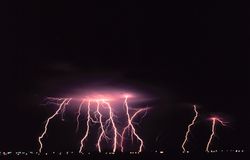
The summer can be extremely hot, as was evident in 2006 with a few-weeks span of nearly 110 °F (43 °C) temperatures. The average temperature is 61.3 °F (16.3 °C),[22] though colder though the winter months, with a 37.8 °F (3.2 °C) average in January, and warmer during the summer months, with an 82.2 °F (27.9 °C) average in July.[22] The city receives about 35.4 inches (900 mm) of precipitation annually.[22]
Norman lies within Tornado Alley and has a severe weather season lasting from March through August, with peak activity in April and May. Tornadoes have occurred during every month of the year. The Oklahoma City metropolitan area, including Norman, is one of the most tornado-prone areas in the United States.[23] As recently as May 10, 2010, a tornado outbreak occurred in southeastern Norman that resulted in the loss of multiple homes and businesses.[24][25]
Demographics
As of the census of 2000,[26] there were 95,694 people, 38,834 households, and 22,562 families residing in the city. The population density was 540.6 people per square mile (208.7/km²). There were 41,547 housing units at an average density of 234.7/sq mi (90.6/km²). The racial makeup of the city was 82.36% White, 4.26% African American, 4.45% Native American, 3.49% Asian, 0.05% Pacific Islander, 1.37% from other races, and 4.01% from two or more races. Hispanic or Latino of any race were 3.89% of the population.
There were 38,834 households of which 27.7% had children under the age of 18, 45.1% were married couples living together, 9.5% had a female householder with no husband present, and 41.9% were non-families. 30.3% of all households were made up of individuals and 6.5% had someone living alone who was 65 years of age or older. The average household size was 2.31 and the average family size was 2.93.
In the city the population was spread out with 21.2% under the age of 18, 21.4% from 18 to 24, 29.1% from 25 to 44, 19.3% from 45 to 64, and 9.0% who were 65 years of age or older. The median age was 29 years. For every 100 females there were 101.0 males. For every 100 females age 18 and over, there were 99.7 males.
The median income for a household in the city was $36,713, and the median income for a family was $51,189. Males had a median income of $35,896 versus $26,394 for females. The per capita income for the city was $20,630. About 7.8% of families and 15.0% of the population were below the poverty line, including 11.4% of those under age 18 and 5.7% of those age 65 or over.
Economy
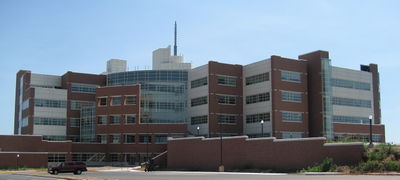
The University of Oklahoma employs over 10,700 personnel across three campuses, making it a significant driver of Norman’s economy.[27] The campus is a center for scientific and technological research, having contributed over $277 million to such programs in 2009.[10]
Norman is also home of the National Weather Center, a cooperative research effort between the University of Oklahoma and the National Oceanic and Atmospheric Administration that houses a number of weather- and climate-related organizations;[28] the city is also the proposed location of a future National Weather Museum.[29] As a result of this on-going academic and public weather research, several private meteorological businesses are present in the city, including Weathernews Americas, Inc., Vieux and Associates, Inc., Weather Decision Technologies, WeatherBank, Inc., and Computational Geosciences, Inc.[30]
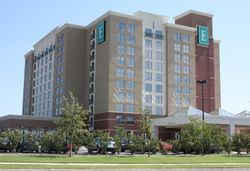
In addition to weather, Norman is also a center for other scientific ventures both public and private. The Oklahoma Geological Survey, which conducts geological research,[31] and the Oklahoma Renewable Energy Council, which is a public-private alliance that is attempting to foster renewable energy applications, both make the city their home.[32] SouthWest NanoTechnologies is a producer of single-walled carbon nanotubes,[33][34] and Bergey Windpower is a leading supplier of small wind turbines.[35]
Other major employers in the city include Norman Regional Health System, Norman Public Schools, Johnson Controls, Griffin Memorial Hospital, Hitachi, Astellas Pharma Technologies, Albon Engineering, Xyant Technology, RiskMetrics Group, Office Max National Sales Center, SITEL, the United States Postal Service National Center for Employee Development, Sysco Corporation, and AT&T.[36]
University North Park, a lifestyle center with planned development on over 12 million square feet of land,[37] is located on 24th Ave NW along the I-35 corridor between Robinson Street and Tecumseh Road. Begun in 2006, the project will feature a two mile stretch of parks, offices, and high-end retail once completed. A ten-story Embassy Suites Hotel and Conference Center opened in 2009.[38]
Fair trade
In 2010, Norman became the 17th city in the United States to adopt a council resolution giving it status as a Fair Trade Town.[39][40] The resolution states that the city of Norman supports the purchasing of goods from the local community; when goods cannot be purchased locally the city will support buying from producers abroad who meet Fair Trade standards.[39] These standards include supporting quality of life in developing countries and planning for environmental sustainability.[39]
Neighborhoods
Norman has a wide variety of neighborhoods. Downtown Norman is an area of approximately two square miles surrounded by University Blvd., Symmes St., Porter Ave., and Dawes St.; primary streets include Main St. and Gray Ave. The area consists mostly of businesses and is home to some of the oldest buildings in Oklahoma.[41]
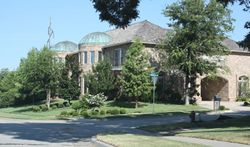
Hall Park is an area northeast of downtown Norman that was originally an independent township; in 2005 it was annexed into Norman, becoming one of its neighborhoods.[42] The area is home to many upper middle-class suburban homes and is historically important in that it was advertised as the United States' first "all-electric town."[42] President Ronald Reagan, then an executive with General Electric, attended the city's grand opening ceremonies in 1962 where he was named as the town's honorary first mayor.[42]
The University of Oklahoma and the area surrounding it are home to many historically-significant neighborhoods. The university itself has a unique Gothic-inspired architecture, known as "Cherokee Gothic," so named by Frank Lloyd Wright.[43] Many churches and houses in the surrounding neighborhoods can be described as neo-Gothic or Queen Anne. The area immediately north of the university is known as Campus Corner and contains many businesses, bars, and restaurants.[44] The neighborhoods immediately to the east of the campus are home to many students, both in residential housing and high-rise condos/apartments.[45]
Norman west of I-35 is home to many upper-class modern neighborhoods, including Brookhaven, Cambridge, and Cascade Estates. Brookhaven Village is a retail area consisting of numerous restaurants and other retail and is located within the Brookhaven addition.
Norman enjoys many tree-lined landscapes thanks in part to its participation in ReLeaf Norman and the Tree City USA programs.[46][47][48]
Education
Higher education
Colleges and universities
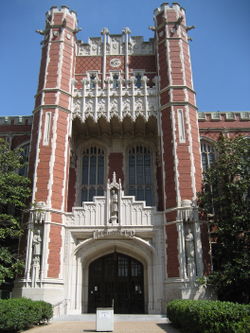
The University of Oklahoma is the largest university in the state of Oklahoma, with approximately 30,000 students enrolled. The university was founded in 1890, prior to Oklahoma statehood. The university includes both Norman and Oklahoma City campuses with the main campus located in Norman. In 2007, The Princeton Review named the University of Oklahoma one of its "Best Value" colleges.[49] The school is ranked first per capita among public universities in enrollment of National Merit Scholars and among the top five in the graduation of Rhodes Scholars. PC Magazine and the Princeton Review rated it one of the "20 Most Wired Colleges" in both 2006 [50] and 2008,[51] while the Carnegie Foundation classifies it as a research university with "high research activity."[52]
The school is well known for its athletic programs, having won many awards including seven NCAA Division I National Football Championships.[53]
CareerTech
The city of Norman is served by the Moore Norman Technology Center. The school was established in 1972 and has been awarded the Oklahoma Association of Technology Center’s Gold Star School Award on multiple occasions.[54] The Franklin Road Campus consists of six buildings totaling 323,500 square feet of classroom, meeting, and office space.[55] The school has a full-time staff of 207.[55]
Primary and secondary schools
Public schools
Norman Public Schools is the city's only public school district. There are 15 elementary schools, four middle schools, and two high schools in the district.[56] More than 14,000 students are enrolled in the district, making it one of the largest in the state.[57]
Private schools
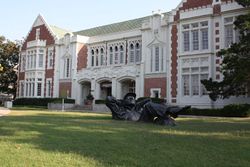
Several private schools also serve the area, most having religious affiliations:
- Community Christian School - kindergarten through 12th grade
- Robinson Street Christian School - kindergarten through 12th grade
- Blue Eagle Christian Academy - kindergarten through 11th grade
- All Saints Catholic School - pre-kindergarten through 8th grade
- Norman Christian Academy - pre-kindergarten through 7th grade
- Trinity Lutheran School - pre-kindergarten through 6th grade
- Veritas Classical Christian Academy - pre-kindergarten through 10th grade
Libraries
Norman is served by the Norman Public Library, which is part of the Pioneer Library System spanning many of the suburbs of Oklahoma City. The library has an inter-library agreement with the Metropolitan Library System of Oklahoma City. This allows patrons of the Norman Public Library to check out books from any library in the Pioneer Library System or in the Metropolitan Library System.[58] Books can be reserved and shipped to a local library free of charge. In addition to books, the library maintains a collection of periodicals, videos, audio books, and research materials.[58]
The Bizzell Memorial Library at the University of Oklahoma is the largest library in the state of Oklahoma, containing more than five million volumes.[59] In addition to books, the library maintains over 17,000 linear feet of manuscripts and archives, 1.6 million photographs, and more than 1.5 million maps.[59] The library also houses more than 50 books printed before the year 1500.[59]
Culture
Museums and theater
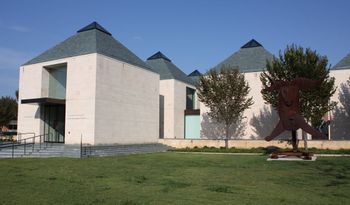
Norman enjoys many cultural attractions that are funded by the university. The Fred Jones Jr. Museum of Art made national and international news in 2000 when it was given the Weitzenhoffer Collection, the largest collection of French Impressionist art ever given to an American university.[60][61][62] The collection includes works by Mary Cassatt, Vincent van Gogh, Paul Gauguin, Pierre-Auguste Renoir, and Camille Pissarro.
The Sam Noble Oklahoma Museum of Natural History is a museum containing over 50,000 square feet of exhibits ranging from archaeology, paleontology, ethnology, herpetology, ornithology, and Native American studies. Its exhibits are intended to immerse visitors in the state’s long history. The museum features many complete collections of dinosaur fossils and is also noted for its Paleozoic collection, considered to be one of the largest and most important in existence.[63]
The Moore-Lindsay House is a Queen Anne-style home built prior to 1900 by prominent Norman home builder William Moore;[64] it was purchased by the city of Norman in 1973 and today serves as the city and Cleveland County's historical museum.[65] Located at 508 N. Peters, the Moore-Lindsay House's architecture is representative of Norman during the Victorian era.[65] The Cleveland County Historical Society maintains a collection of over 5,000 rare books, documents, and other artifacts in its archives located inside the house.[66]
Catlett Music Center at the University of Oklahoma features many orchestral and jazz performances and the Weitzenhoffer School of Musical Theatre offers many student programs throughout the year.
The city is also home to many privately-funded galleries and performance sites including Mainsite Contemporary Art Gallery, Sonder Music Dance & Art, Dreamer Concepts, Jacobson House Native Arts Center, the Firehouse Art Center, and the Sooner Theater.
Parks and recreation
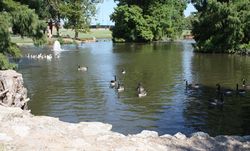
Norman’s Parks and Recreation Department facilitates 55 neighborhood and community parks, three recreation centers, a golf course and driving range, three disc golf courses, a complete swim complex with waterslides, a wading pool, 32 tennis courts, and three special services centers (that offer cultural arts and senior citizen activities). Griffin Community Park Sports Complex includes 16 soccer fields, 14 baseball/softball fields, and four football fields.[67]
Media
The Norman Transcript is the most widely-circulated Norman-based newspaper in the city. It is a daily newspaper covering events in Cleveland and McClain counties. It is the oldest continuous business in Norman and was founded shortly after the Land Run of April 1889 on July 13, 1889.[68]
The Oklahoma Daily is a student-run newspaper at the University of Oklahoma. It was first published in 1897, several years after the university’s founding. The paper has received numerous awards for journalism excellence including the Associated Collegiate Press’ Pacemaker Award.[69]
KGOU is a full-service public radio station licensed to the University of Oklahoma. The station serves Norman and the greater Oklahoma City metropolitan area with a news/talk/jazz format, utilizing programs from National Public Radio, Public Radio International, and others.
Norman TV is a government-access television station airing on Cox Communications cable television channel 20. It broadcasts programming provided by the City of Norman, including video from city council meetings.
Sports
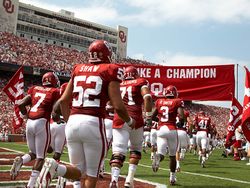
Most sports in Norman center around the University of Oklahoma. The school is well-known for its athletic programs and has won seven NCAA Division I National Football Championships.[53] Its baseball team has won two NCAA national championships and the women's softball team won the national championship in 2000. The gymnastics teams have won four national championships since 2002.
OU's football program has the best winning percentage of any Division I FBS team since the introduction of the AP Poll in 1936,[70] playing in four BCS national championship games since the inception of the BCS system in 1998.
University men's sports include the following: baseball, basketball, cross country, football, golf, gymnastics, tennis, track and field, and wrestling. Women's sports include: basketball, cross country, golf, gymnastics, rowing, soccer, softball, tennis, track and field, and volleyball.
Community events
Norman hosts many free festivals and community events that occur throughout the year.
Medieval Fair is a celebration of medieval-themed games, art, and culture. The event is held during the last weekend of March in Reaves Park. It has been held annually in Norman since 1976 and was originally a forum for the English Department at the University of Oklahoma.[71] Today it is the largest weekend event held in the state of Oklahoma, with over 325,000 people in attendance in 2006.[72] Events Media Network has named Medieval Fair one of the top 100 events in the United States.
Norman Music Festival is an annual weekend music festival held in April in downtown Norman. Established in 2008, the event had over 26,000 people in attendance during the 2009 festival.[73] Originally a one-day event, the festival has quickly grown so large that it is now an all-weekend concert series. The festival highlights both local musicians and internationally-acclaimed artists and features many forms and styles of music.[74]
Groovefest is a music festival held semi-annually at Andrews Park. Each Spring and Fall the music festival is held to help raise awareness about human rights. The event was established in 1986 by the University of Oklahoma chapter of Amnesty International.[75]
Jazz in June is a music festival held over all weekends in June at various venues across Norman. The festival features both jazz music performances as well as jazz clinics instructed by professional musicians.[76]
May Fair is an arts festival held every year during the first weekend in May at Andrews Park. It features top area performers, fine art, crafts, and food.[77]
Summer Breeze Concert Series is a series of concerts held from Spring to Fall at various park venues across Norman. The series is sponsored by the Performing Arts Studio.[78]
Midsummer Nights' Fair is a nighttime arts festival held during two evenings in June. The fair features art, music, and food and is held outside the Firehouse Art Center located in Lions Park.[79]
The Norman Mardi Gras parade is a celebration of Mardi Gras occurring on the Saturday closest to Fat Tuesday. The parade is held in downtown Norman and features themed costumes and floats.[80]
The Main Street Christmas Holiday Parade is a celebration of Christmas and the holiday season held every December in downtown Norman. The parade features holiday-themed costumes and floats.[81]
Infrastructure
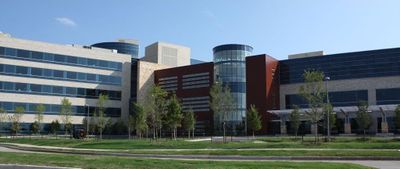
Health systems
Norman has several hospitals, urgent care clinics, and medical research facilities within its city limits.
Norman Regional Health System is the largest provider of medical services in the city. Its Porter Avenue campus, located in east Norman, is a 337-bed general hospital providing a wide range of services including acute care.[82] In October 2009, the Norman Regional HealthPlex campus opened in west Norman. It provides a 152-bed state-of-the-art facility specializing in cardiology, cardiovascular services, and women's and children's services.[83][84]
Transportation
Airports
Scheduled air transport, or major commercial air transportation, is available at Will Rogers World Airport in Oklahoma City, located approximately 20 miles north of Norman. The airport serves approximately 3.38 million passengers per year.[85]
Norman is served locally by Max Westheimer Airport, a general aviation airport run by the University of Oklahoma.[86] The airport is one of only two airports in the Oklahoma City metropolitan area designated as a reliever airport to Will Rogers World Airport. Max Westheimer Airport is capable of handling aircraft up through and including executive class jet aircraft.[87]
Buses
Cleveland Area Rapid Transit provides bus service throughout Norman seven days a week, with additional routes being available during weekdays and while the University of Oklahoma's classes are in session.[88] A connecting route runs to Oklahoma City's Metro Transit hub. Metro Transit maintains a fleet of buses and trolleys serving the greater Oklahoma City area, including Will Rogers World Airport.[88]
Cleveland Area Rapid Transit is operated by the University of Oklahoma; the service is free to faculty, staff, and students of the university.[88]
Rail
Inter-city passenger train service is available via Amtrak at Norman's Depot. Amtrak's Heartland Flyer provides daily round trip service to downtown Oklahoma City and Fort Worth, Texas.
Although Norman currently has no light rail or commuter rail service, there is growing interest in incorporating such services into the city's future transportation plans.[89]
Roads and highways
Like many other cities in the United States, roads and highways are the primary means of transportation in the city of Norman; as of 2007, I-35 alone was handling over 99,000 vehicles per day.[90] City roads are arranged in a grid-like fashion, with Porter Avenue running from north to south and serving as the east-west boundary, and Main Street serving as the north-south boundary. Major east-west streets include: Tecumseh Road, Rock Creed Road, Robinson Street, Main Street, Boyd Street, Lindsey Street, and Imhoff Road. Almost all major north-south avenues are numbered, separated by 12 city blocks each with a direction abbreviation following, such as "36th Avenue NW." Exceptions include Flood Ave., Porter Ave., and Classen Blvd.
Norman is served by two major federal highways:
.svg.png) Interstate 35
Interstate 35 U.S. Highway 77
U.S. Highway 77
Norman is served by two major Oklahoma state highways:
 State Highway 9
State Highway 9 State Highway 77H
State Highway 77H
Utilities
Norman's electric system is maintained by several companies including Oklahoma Gas & Electric, which is headquartered in Oklahoma City. Natural gas is provided by Oklahoma Natural Gas, also headquartered in Oklahoma City. The city of Norman offers water, garbage pickup, and recycling service through its Utilities Department.[91] Telephone networks, broadband internet, and cable television service are available from several companies including AT&T and Cox Communications.
See also
- Campus Corner
- Cleveland Area Rapid Transit
- Lake Thunderbird
- List of people from Norman, Oklahoma
- Norman Police Department
- Norman Public Schools
- University of Oklahoma
- University of Oklahoma Westheimer Airport
References
- ↑ "American FactFinder". United States Census Bureau. http://factfinder.census.gov. Retrieved 2008-01-31.
- ↑ "US Board on Geographic Names". United States Geological Survey. 2007-10-25. http://geonames.usgs.gov. Retrieved 2008-01-31.
- ↑ "OMB Bulletin No. 10-02". U.S. Office of Management and Budget. http://www.whitehouse.gov/omb/assets/bulletins/b10-02.pdf. Retrieved 2010-07-31.
- ↑ "Norman city, Oklahoma Population Finder". U.S. Census Bureau. http://factfinder.census.gov/servlet/SAFFPopulation?_event=&geo_id=16000US4052500&_geoContext=01000US. Retrieved 2009-09-23.
- ↑ "Biggest Cities in Oklahoma". GeoNames. http://www.geonames.org/US/OK/largest-cities-in-oklahoma.htm. Retrieved 2009-09-23.
- ↑ "Cities with 100,000 or More". U.S. Census Bureau. http://www.census.gov/statab/ccdb/cit1040a.txt. Retrieved 2010-07-31.
- ↑ "United States by Places County Subdivisions with 50,000 or More Population". U.S. Census Bureau. http://factfinder.census.gov/servlet/GCTTable?_bm=y&-geo_id=&-ds_name=DEC_2000_SF1_U&-_lang=en&-mt_name=DEC_2000_SF1_U_GCTPH1R_US13S&-format=US-13. Retrieved 2010-07-31.
- ↑ "Find a County". National Association of Counties. http://www.naco.org/Template.cfm?Section=Find_a_County&Template=/cffiles/counties/county.cfm&id=40027. Retrieved 2009-09-23.
- ↑ "Best Places to Live". MONEY Magazine. http://money.cnn.com/magazines/moneymag/bplive/2008/. Retrieved 2008-07-17.
- ↑ 10.0 10.1 "OU Facts". OU. http://www.ou.edu/publicaffairs/oufacts.html. Retrieved 2009-08-29.
- ↑ "Summary of Oklahoma's Colleges, Universities, and Career Schools". Education Portal. http://education-portal.com/articles/Oklahoma_(OK)%3A_Summary_of_Oklahoma%27s_Colleges%2C_Universities%2C_and_Career_Schools.html. Retrieved 2009-08-29.
- ↑ 12.0 12.1 12.2 12.3 12.4 12.5 The University of Oklahoma: A History (Volume I). University of Oklahoma Press. http://books.google.com/books?id=2Wlj-XkxJfUC&printsec=frontcover#v=onepage&q=&f=false. Retrieved 2009-09-23.
- ↑ "Norman: Our History". City of Norman. http://www.ci.norman.ok.us/our_history.htm. Retrieved 2009-09-23.
- ↑ 14.0 14.1 14.2 14.3 14.4 14.5 14.6 O'Dell, Larry, "Norman," Encyclopedia of Oklahoma History (accessed June 1, 2010).
- ↑ "Max Westheimer Field". rv-9.com. http://www.rv-9.com/maxwf.html. Retrieved 2010-08-01.
- ↑ Cockerell, Penny. "50 Years: As the intersection of Interstates 35, 40, and 44, Oklahoma is at America's crossroads." The Daily Oklahoman 29 June 2006: 2A.
- ↑ 17.0 17.1 17.2 17.3 "City Government". City of Norman. http://www.ci.norman.ok.us/content/city-government. Retrieved 2010-07-31.
- ↑ "Boards & Commissions". City of Norman. http://www.ci.norman.ok.us/content/boards-commissions. Retrieved 2010-07-31.
- ↑ 19.0 19.1 "Crime in Norman, Oklahoma". City-Data.com. http://www.city-data.com/crime/crime-Norman-Oklahoma.html. Retrieved 2010-07-31.
- ↑ 20.0 20.1 "U.S. Gazetteer Files". U.S. Census Bureau. http://www.census.gov/geo/www/gazetteer/gazette.html. Retrieved 2009-09-23.
- ↑ "Oklahoma by Place - GCT-PH1. Population, Housing Units, Area, and Density: 2000". United States Census Bureau. http://factfinder.census.gov/servlet/GCTTable?_bm=y&-context=gct&-ds_name=DEC_2000_SF1_U&-mt_name=DEC_2000_SF1_U_GCTPH1_ST7&-CONTEXT=gct&-tree_id=4001&-geo_id=04000US40&-format=ST-7%7CST-7S&-_lang=en. Retrieved 2007-07-20.
- ↑ 22.0 22.1 22.2 "Historical Weather for Norman, OK". Weather Base. http://www.weatherbase.com/weather/weather.php3?s=683643&refer=. Retrieved 2009-09-23.
- ↑ "Tornadoes in the Oklahoma City, OK Area Since 1890". National Weather Service. http://www.srh.noaa.gov/oun/tornadodata/okc/. Retrieved 2009-09-23.
- ↑ "Several businesses damaged by Monday tornado". The Norman Transcript. http://normantranscript.com/local/x433568766/Several-businesses-damaged-by-Monday-tornado. Retrieved 2010-05-16.
- ↑ "Tornadoes rated EF2, EF3". The Norman Transcript. http://normantranscript.com/headlines/x433567446/Tornadoes-rated-EF2-EF3. Retrieved 2010-05-16.
- ↑ "Norman City Fact Sheet". U.S. Census Bureau. http://factfinder.census.gov/servlet/ACSSAFFFacts?_event=ChangeGeoContext&geo_id=16000US4052500&_geoContext=&_street=&_county=norman%2C+ok&_cityTown=norman%2C+ok&_state=&_zip=&_lang=en&_sse=on&ActiveGeoDiv=&_useEV=&pctxt=fph&pgsl=010&_submenuId=factsheet_1&ds_name=ACS_2007_3YR_SAFF&_ci_nbr=null&qr_name=null®=null%3Anull&_keyword=&_industry=. Retrieved 2009-09-23.
- ↑ "Human Resources". University of Oklahoma. http://www.hr.ou.edu/employee_resources/. Retrieved 2009-09-26.
- ↑ "National Weather Center". National Weather Center. http://www.nwc.ou.edu/. Retrieved 2010-08-07.
- ↑ "National Weather Museum in the Works in Oklahoma". USA Today. 2009-01-02. http://www.usatoday.com/weather/news/2009-01-02-national-weather-museum_N.htm. Retrieved 2009-12-06.
- ↑ Oklahoma Department of Commerce
- ↑ "Oklahoma Geological Survey". Oklahoma Geological Survey. http://www.ogs.ou.edu. Retrieved 2010-08-07.
- ↑ "Oklahoma Renewable Energy Council". Oklahoma Renewable Energy Council. http://www.seic.okstate.edu/OREC/. Retrieved 2010-08-07.
- ↑ "A New Silicon Valley on the Oklahoma Prairie?". Huffington Post. http://www.huffingtonpost.com/al-eisele/a-new-silicon-valley-on-t_b_132448.html. Retrieved 2009-02-07.
- ↑ "SWeNT Opens Commercial-Scale Nanotube Manufacturing Plant". Nanotechnology Now. http://www.nanotech-now.com/news.cgi?story_id=30826. Retrieved 2009-02-07.
- ↑ "Bergey Windpower, Inc". http://www.bergey.com/. Retrieved 2010-01-30.
- ↑ "Employment". Norman Chamber of Commerce. http://www.normanchamber.com/pages/employment. Retrieved 2010-08-07.
- ↑ "Businesses Coming to University North Park". The Norman Transcript. http://www.normantranscript.com/localnews/local_story_226234449. Retrieved 2009-01-11.
- ↑ "Embassy Suites Celebrates Grand Opening With United Way Benefit". The Norman Transcript. http://www.normantranscript.com/localnews/local_story_347025000. Retrieved 2009-01-11.
- ↑ 39.0 39.1 39.2 "Norman, OK - Fair Trade Town #17!!!". Fair Trade Towns USA. http://transfairusa.org/fttowns/?p=296. Retrieved 2010-08-16.
- ↑ "Norman Fair Trade". Norman Fair Trade. http://www.normanfairtrade.org/. Retrieved 2010-08-16.
- ↑ Caldwell et al, John Michael (1989). A Centennial Album of Cleveland County 1889 - 1989. Norman, OK: Norman Transcript Press.
- ↑ 42.0 42.1 42.2 "Hall Park". Encyclopedia of Oklahoma History and Culture. http://digital.library.okstate.edu/encyclopedia/entries/H/HA005.html. Retrieved 2010-08-17.
- ↑ "Evans Hall". University of Oklahoma. http://www.ou.edu/discover/discover_home/virtual_tour/evans_hall.html. Retrieved 2010-08-17.
- ↑ "Campus Corner". Campus Corner. http://www.oucampuscorner.com. Retrieved 2010-08-17.
- ↑ "New Sites to Open". OU Daily. http://oudaily.com/news/2004/apr/30/new-sites-to-open/. Retrieved 2009-08-29.
- ↑ "ReLeaf Norman". City of Norman. http://www.ci.norman.ok.us/tips/ReLeafNorman/default.htm. Retrieved 2009-08-29.
- ↑ "Tree City/Tree Line USA Programs". OK Dept. of Forestry. http://www.forestry.ok.gov/tree-citytree-line-usa-programs. Retrieved 2009-08-29.
- ↑ "Tree Cities". Tree City USA. http://www.arborday.org/programs/treeCityUSA/treecities.cfm?chosenstate=Oklahoma. Retrieved 2010-08-17.
- ↑ "America's Best Value Colleges". The Princeton Review. http://www.princetonreview.com/college/research/bestvalue/results.asp?page=6. Retrieved 2006-06-07.
- ↑ "Top 20 Wired Colleges". PC Magazine. 2006. http://www.pcmag.com/article2/0,1895,2073606,00.asp. Retrieved 2007-04-09.
- ↑ "Top 20 Wired Colleges". PC Magazine. 2008. http://www.pcmag.com/article2/0,2817,2329359,00.asp. Retrieved 2008-09-03.
- ↑ "University of Oklahoma Norman Campus". Carnegie Foundation for the Advancement of Teaching. http://www.carnegiefoundation.org/classifications/sub.asp?key=748&subkey=7033&start=782. Retrieved 2006-06-07.
- ↑ 53.0 53.1 "Schools with the Most NCAA Championships". NCAA. http://www.ncaa.org/champadmin/champs_listing1.html. Retrieved 2007-05-07.
- ↑ "About MNTC". Moore Norman Technology Center. http://mntechnology.com/about-mntc. Retrieved 2009-12-06.
- ↑ 55.0 55.1 "Franklin Road Campus". Moore-Norman Technology Center. http://mntechnology.com/about-mntc/franklin-road-campus. Retrieved 2010-08-06.
- ↑ "Norman Public Schools". Norman Public Schools. http://www.norman.k12.ok.us/. Retrieved 2010-07-31.
- ↑ "Norman Schools". Local School Directory. http://www.localschooldirectory.com/city-schools/Norman/OK. Retrieved 2010-07-31.
- ↑ 58.0 58.1 "Norman Public Library". Pioneer Library System. http://www.pioneer.lib.ok.us/nortop. Retrieved 2010-08-06.
- ↑ 59.0 59.1 59.2 "OU Libraries' Facts". University of Oklahoma. http://libraries.ou.edu/cms/default.aspx?id=15. Retrieved 2010-08-06.
- ↑ "Impressionists at the Fred Jones Jr. Museum of Art". French Culture. http://www.frenchculture.org/spip.php?article453. Retrieved 2009-08-29.
- ↑ "Cityscape: Norman, OK". NY Art Magazine. http://www.nyartsmagazine.com/index.php?option=com_content&task=view&id=4582&Itemid=705. Retrieved 2009-08-29.
- ↑ "Art museum drawing national attention". OU Daily. http://oudaily.com/news/2006/aug/23/art-museum-drawing-national-attention. Retrieved 2009-08-29.
- ↑ "Vertebrate Paleontology Main Page". University of Oklahoma. http://www.snomnh.ou.edu/collections-research/vertpaleo.htm. Retrieved 2009-12-06.
- ↑ Caldwell et al, John Michael (1989). A Centennial Album of Cleveland County 1889 - 1989. Norman, OK: Norman Transcript Press.
- ↑ 65.0 65.1 "Cleveland County Historical Society". Cleveland County Historical Society. http://www.normanhistorichouse.org/gpage3.html. Retrieved 2010-08-11.
- ↑ "Moore-Lindsay Historical House hosting Victorian All-Hallows Eve Open House tonight and Saturday". Norman Transcript. http://normantranscript.com/local/x546387704/Moore-Lindsay-Historical-House-hosting-Victorian-All-Hallows-Eve-Open-House-tonight-and-Saturday. Retrieved 2010-08-11.
- ↑ "Park Directory". City of Norman. http://www.ci.norman.ok.us/parks/park-directory. Retrieved 2009-12-06.
- ↑ "History of the Norman Transcript". The Norman Transcript. http://www.normantranscript.com/aboutus/local_story_201224905.html. Retrieved 2009-12-06.
- ↑ "OU Student Media". University of Oklahoma. http://www.studentmedia.ou.edu/. Retrieved 2010-04-20.
- ↑ "Oklahoma Football Quick Facts". SoonerSports.com. University of Oklahoma. http://www.soonersports.com/sports/m-footbl/archive/m-footbl-quick-facts.html. Retrieved 2007-08-21.
- ↑ "History of Medieval Fair". Medieval Fair. http://medievalfair.occe.ou.edu/history.html. Retrieved 2009-12-28.
- ↑ "Medieval Fair". The Norman Transcript. http://normantranscript.com/entertainment/local_story_082004046. Retrieved 2009-12-28.
- ↑ "Downtown Music Festival Moving to Two-Day Event". The Norman Transcript. http://www.normantranscript.com/archivesearch/local_story_257202007.html. Retrieved 2009-12-28.
- ↑ "Norman Music Festival". Norman Music Festival. http://www.normanmusicfestival.com/. Retrieved 2009-12-28.
- ↑ "About Groovefest". Groovefest. http://www.groovefest.org/. Retrieved 2009-12-28.
- ↑ "Jazz in June". Jazz in June. http://www.jazzinjune.org/. Retrieved 2009-12-28.
- ↑ "Norman's May Fair Arts Festival". About.com. http://okc.about.com/od/artsandentertainment/p/normanmayfair.htm. Retrieved 2009-12-28.
- ↑ "Summer Breeze Concert Series". The Performing Arts Studio. http://www.thepas.org/content/blogcategory/18/74/. Retrieved 2009-12-28.
- ↑ "Midsummer Nights' Fair". Firehouse Art Center. http://normanfirehouse.moonfruit.com/#/midsummer-nights-fair/4524980380. Retrieved 2009-12-28.
- ↑ "15th annual Norman Mardi Gras Parade Saturday". The Norman Transcript. http://www.normantranscript.com/localnews/local_story_051015121. Retrieved 2009-12-28.
- ↑ "Deering Selected as Holiday Parade Marshal". The Norman Transcript. http://www.normantranscript.com/localnews/local_story_340021522. Retrieved 2009-12-28.
- ↑ "About Us". Norman Regional Health System. http://www.normanregional.com/en/about.html. Retrieved 2010-08-06.
- ↑ "HealthPlex Checkup". Norman Transcript. http://normantranscript.com/headlines/x378274727/HealthPlex-checkup. Retrieved 2010-08-06.
- ↑ "Welcome to HealthPlex". Norman Regional Health System. http://www.normanregional.com/en/facility_healthplex.html?placeValuesBeforeTB_=savedValues&TB_iframe=true&height=630&width=890. Retrieved 2010-08-06.
- ↑ "Aviation Activity Report". Will Rogers World Airport. http://www.flyokc.com/releases%5C10-06%20Email%20December%20Activity.pdf. Retrieved 2010-08-06.
- ↑ "Max Westheimer Airport". University of Oklahoma. http://airport.ou.edu. Retrieved 2007-08-14.
- ↑ "Airport Services". Max Westheimer Airport. http://www.ou.edu/org/airport/Airport%20Services/Airport%20Services.html. Retrieved 2010-08-06.
- ↑ 88.0 88.1 88.2 "Norman CART". CART. http://cart.ou.edu/. Retrieved 2007-08-14.
- ↑ "City's Light Rail Hopes Get a Boost". Norman Transcript. http://normantranscript.com/local/x546386626/Citys-light-rail-hopes-get-boost. Retrieved 2010-08-06.
- ↑ "I-35 Widening Will Be A Fast Track". Norman Transcript. http://normantranscript.com/homepage/x518993409/I-35-widening-will-be-a-fast-track-project?keyword=leadpicturestory. Retrieved 2010-08-06.
- ↑ "Utilities". City of Norman. http://www.ci.norman.ok.us/content/utilities. Retrieved 2010-08-06.
External links
- Campus Corner
- City of Norman
- Groovefest
- Jazz In June
- May Fair Arts Festival
- Medieval Fair
- Midsummer Nights' Fair
- Norman Chamber of Commerce
- Norman Community Events Calendar
- Norman Convention and Visitors Bureau
- Norman Music Festival
- Norman Public Library
- Summer Breeze Concert Series
|
||||||||||||||||||||
|
|||||||||||||||||||||||||||||||||||||||||
|
|||||||||||||||||
